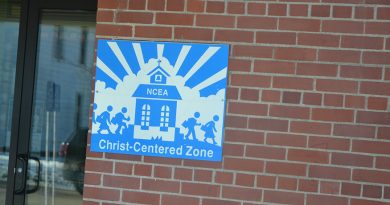Leading Catholic higher education in the 21st century
President Collins heads Iowa’s oldest Catholic college
By Jill Kruse
Witness Editorial Assistant
This is part one of a three part series on the leaders of the Catholic college and two universities in the Archdiocese of Dubuque.
DUBUQUE — When 18-year-old Jim Collins left his home in Crystal Lake, Illinois, to begin his first year of studies at Loras College in the fall of 1980, the young freshman probably never imagined that one day he would be elected to serve as the college’s president. But after graduating four years later with a degree in finance, and after working for two decades in various roles in the college’s administration, Collins received the great honor in 2004 of being named the 26th president of his alma mater.
“I wanted a Catholic institution … a place that was strong in the liberal arts and that was residential,” reflected President Collins, when asked why he decided to attend Loras after graduating from Marian Central Catholic High School in Woodstock in the Diocese of Rockford. “It was also a reasonable distance from home. It was far enough away that I felt like I was getting away, but close enough that I could get back,” added Collins, whose choice of a college in Dubuque put him just a few short hours from his parents and five younger siblings.
After he graduated from college in 1984, Collins began working in the Admissions Department at Loras, where he remained for three years. He would continue at Loras first as the director of special projects, then as the alumni director, then as the assistant to the president. Collins would also serve as the vice president for advancement and as the senior vice president of the college. While working at Loras, he also received his master’s degree in higher education from the University of Iowa.
Collins, who has now been the president at Loras for nearly 12 years, said one of the aspects of his job he values the most are the conversations he gets to have with students. Despite his busy schedule, he has committed to meeting with a randomly selected group of students every other week during the academic year. “I love the opportunity to interact with them,” he shared. “It’s always good to hear their perspective on things. They ask lots of questions about the college and where we’re headed. It’s fun.”
President Collins believes it’s the students, all 1,600 of them, along with the college’s faculty and staff that make Loras such an extraordinary place. “I’m never underwhelmed by students’ willingness to step out of their comfort zone and do something great,” Collins said. “And I’m overly impressed by the commitment of the faculty and staff to student success and the hours they dedicate and the approach and innovation they bring to students’ education.”
Besides the quality and character of its students, faculty and staff, Collins said the other fundamental aspect that is key to understanding the Loras College experience is faith. “Our Catholic identity is the most important element of who we are,” he said. “I believe passionately that what is missing in today’s society is a holistic education. … We really work hard at Loras to provide opportunities for the spiritual, intellectual, physical and emotional development of the individual.”
This past year, President Collins had the opportunity to serve as the board chair for the Association of Catholic Colleges and Universities (ACCU), which acts as the collective voice for Catholic higher education in the U.S. He said he was honored to serve in the role and proud of the work the group continues to accomplish. “The association fosters greater collaboration among Catholic colleges and universities,” he said, “and has played a critical role in recent years in defending issues of religious liberty and protecting the autonomy of Catholic institutions …”
Those Catholic institutions face several major challenges today, according to President Collins. He noted that society’s general trend away from religion and toward secularization has impacted faith-based institutions of learning. He said that there also exists a significant geographic challenge, since two-thirds of all Catholic colleges and universities sit in the Midwest and Northeast, while the greatest growth among young Catholics in the United States can be found in the South and Southwest.
President Collins also pointed to the decline in family size as an additional hurdle to be overcome by Catholic colleges and universities today. “It means there are acutely fewer students enrolling in Catholic higher education and fewer students looking toward Catholic higher education for the future,” he said. Collins, who with his wife, Lisa, has six children, joked, “families as big as ours are rare today; we’re the last of a dying breed.”
But Loras is taking steps to counter many of the challenges it faces. President Collins said the institution is in a conversation with the other five Catholic colleges and universities in Iowa to explore how they might better work together, and in some instances share technology, libraries, learning platforms, etc., in order to save money in creative, collaborative ways. Loras is working to establish additional relationships, such as with other diocesan colleges, in order to offer joint service programs and outreach and provide more opportunities for prospective students. President Collins said Loras is also bolstering its recruitment efforts and trying to capture new markets that have more students who might be interested in Catholic higher education. The college is, for example, taking steps to enhance its already strong relationship with Cristo Rey, a national network of more than 30 Catholic high schools.
Collins, who serves as the president of the oldest college in the state of Iowa, said he’s proud of Catholic higher education’s rich history but also remains optimistic about its bright future. “Catholic colleges and universities offer society a powerful combination of faith and reason, and provide a strong approach on civic engagement and the ability to dialogue with one another even though you have differing views. The benefits this kind of education provides are increasingly relevant and valuable,” he said. “I believe the pendulum will swing the other way and what has been a movement away from faith and religion in our society will be a greater draw and desire for faith and religion, and Catholic colleges and universities are particularly well poised to serve that new found swing.”
Next week: a conversation with Mt. Mercy University’s president.
(Photo contributed by Loras College)




